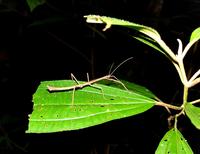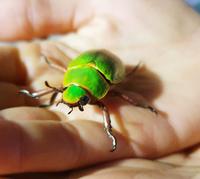Although small, and often hidden from everyday life, the importance of insects cannot be overstated. They pollinate our crops, disperse seeds, decompose organic matter, and even perform free pest control! All of these different roles mean that insects play a significant part in maintaining the function and stability of Earth’s ecosystems. Not only that, but these functions are also critical to society. For example, the role of pollinating insects in maintaining food security is of significant importance to sustainable development. Further to their ecological roles, insects have also made tremendous contributions to human culture, including in mythology, poetry, and art.

A stick insect on a leaf (credit Natalie Duffus)
The important and value of these tiny creatures makes it so troubling that there is evidence of insect populations declining across the globe, and even here in the UK, prompting fears of the ‘insect apocalypse’. This leaves our ecosystems vulnerable to the effects of decreasing insect diversity, including a reduction in the quantity and quality of pollination services. In addition, future generations may never get to enjoy the marvel of some of our most beautiful and rare insects.
As an insect conservationist, I am constantly confronted with the challenge of indifference, ignorance, or outright disgust toward insects. These are challenges not so frequently faced by my counterparts working to conserve populations of mammals, such as pandas, or tigers. It is easy to see how this happens, insects are generally small, and often activate that creepy-crawly ‘ick!’ factor.
These differing attitudes toward insects versus mammals (or other large animals) can even be observed in policies for conservation. While at the University of Aberdeen studying for a degree in Conservation Biology I conducted a study, published today in Biological Conservation, alongside Dr Juliano Morimoto, which found that while mammals are afforded strong legislative protection in the UK and Ireland, very few insects receive the same standard of protection. Those that do, tend to be butterflies and moths, while bees, flies, and other less conspicuous insects are absent from policies – including some which are endangered species. For example, the Wildlife and Countryside Act 1981 protects 75% of mammals which are endangered in the UK, versus just 0.07% of insects endangered in the UK.

A jewel scarab beetle on someone's hand (credit Natalie Duffus)
It is my hope that policy-makers will take note of our findings, and act to conserve insects. This includes protecting their habitats from further human development, reducing pesticide use, and tackling pollution and other land degrading activities. Now that I am doing my DPhil in the Department of Biology, funded by NERC and Reuben College, I hope to provide further data for policy-makers which will allow them to conserve the insects that I love. For example, by exploring whether policies seeking to give no-net-loss in biodiversity are truly effective. Along the way, I also aspire to convince some people that insects aren’t the mini-monsters many think they are…
Natalie Duffus is a first year DPhil student on the NERC DTP programme at Reuben College, who graduated from the University of Aberdeen receiving the Professor Ian Alexander Prize for outstanding performance in conservation biology. She also sits on the GCR exec committee as the Vice President of Social Affairs.
Read the full paper here.